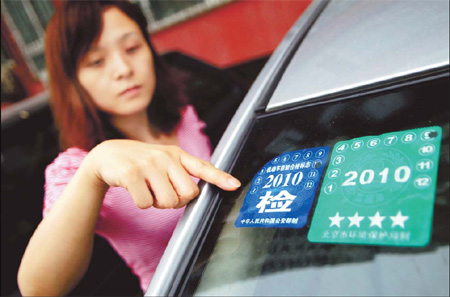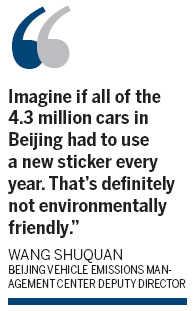Top Stories
Technology gives drivers green light
By Meng Jing (China Daily)
Updated: 2010-06-17 09:57
 |
Large Medium Small |
By the end of 2011, all drivers in Beijing will be able to replace their environmental passes every six years instead of annually, thanks to Radio-frequency identification (RFID) technology.
|
 All environmental passes will turn electronic by the end of 2011.[Wang Jing / China Daily] |
The environmental pass is a green windscreen decal granted by the Beijing municipal environmental protection bureau. Currently, every car passing the emissions examination in Beijing is required to renew it every year.
With RFID technology being applied to the decals, the emissions information of a vehicle can be updated through a reader without changing the original. The RFID decals have been applied to vehicles in Beijing since early 2009 and as many as three million cars in the city carry the new environmental passes.
All the cars in Beijing are required to display the green decal on the right corner of their front windshields as a sign that they've passed the emission test. Any car, which is found running on the streets without the pass faces a 200-yuan fine by the traffic control department.
The cost of a RFID environmental decal is 6 yuan while the original sticker cost around 0.5 yuan. However, Wang Shuquan, the deputy director of the Beijing vehicle emissions management center, said it is worth the money.
 "Imagine if all of the 4.3 million cars in Beijing had to use a new sticker every year. That's definitely not environmentally friendly. Plus, we can cut back on our management costs due to the new system," he told METRO.
"Imagine if all of the 4.3 million cars in Beijing had to use a new sticker every year. That's definitely not environmentally friendly. Plus, we can cut back on our management costs due to the new system," he told METRO.
Before the RFID system, Wang's center had a supervisor at each of the 43 test enters.
"Now, all the information regarding color, type and license number of the car can be read from the RFID and a camera can transmit images of the emissions test to our center at the same time," Wang said.
Four workers at the monitoring office supervise the emissions tests to make sure the car getting tested has the same information on the environmental label.
Gao Libing, the manager of Shenghua vehicle detection center located in Chaoyang district, said the RFID label speeds up the whole testing procedure.
"All the statistics are transmitted to our computers after the emissions test and input to the environmental decal immediately, which guarantees the test can be finished in five minutes," he said.
Li Jian, a driver in Beijing, welcomed the new decal, believing the technology can record information more accurately.
"And it is such a relief that we don't need to replace it every year. I've tried hot water and a hair dryer, but the label is so difficult to get rid of due to the strong adhesive," he said.